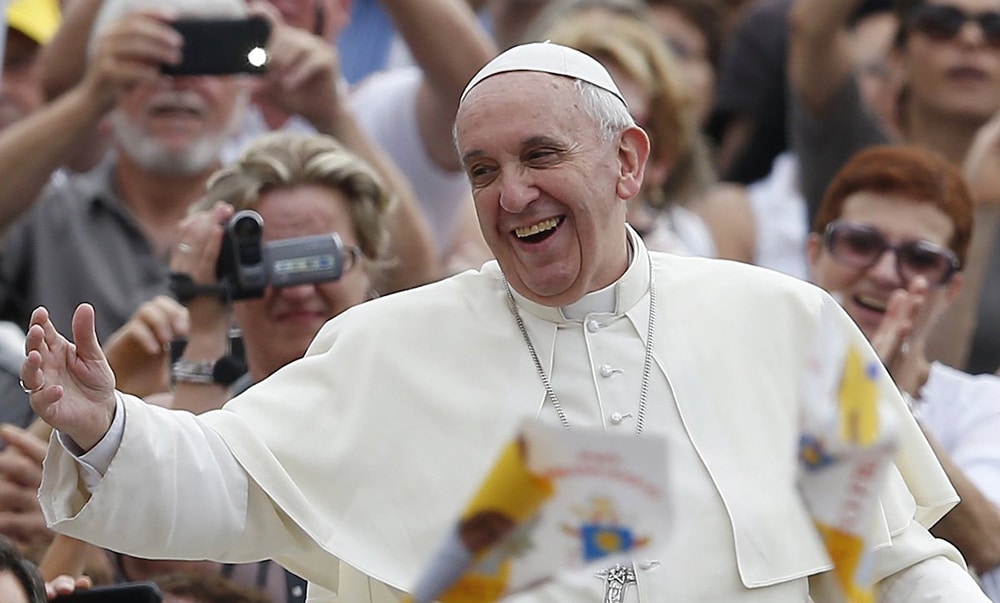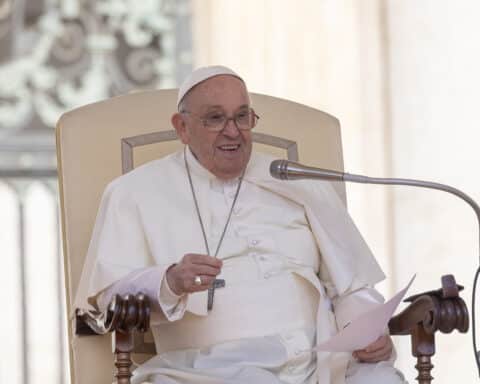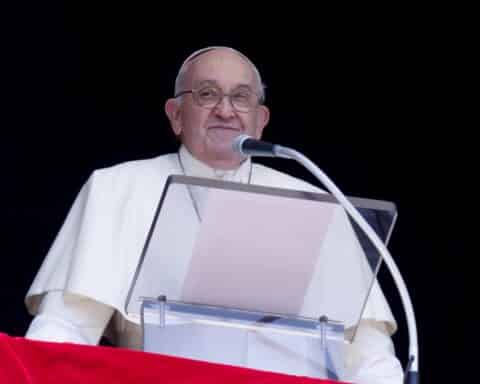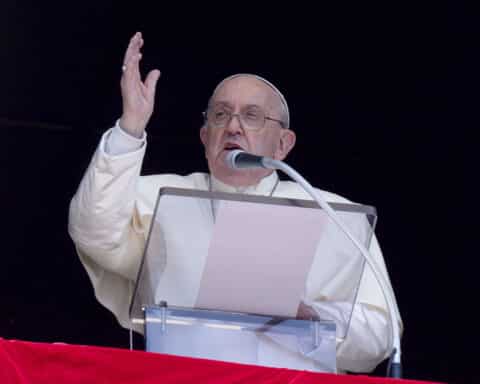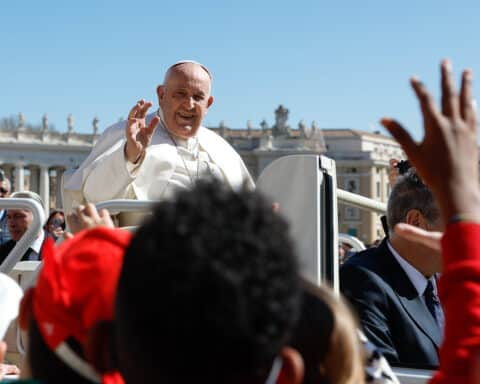To understand the first 10 years of Pope Francis, it is helpful to go back to the beginning. For what Francis made clear before he became pope in 2013 and after was his passionate hope that the Church would recover its missionary zeal, and his deep concern for a status quo that often seemed, in his words, to be more about maintenance than mission.
Speaking to the cardinals before the 2013 conclave, in a brief address credited by some with propelling him into the Chair of Peter, Cardinal Jorge Bergoglio made clear his concern for a status quo Church “wrapped up in its own world.”
“The evils that, over time, appear in Church institutions have their root in self-referentiality, a kind of theological narcissism,” he told his fellow cardinals. The Church needed to choose between a listening and evangelizing Church or a “worldly Church that lives in itself, of itself, for itself.”
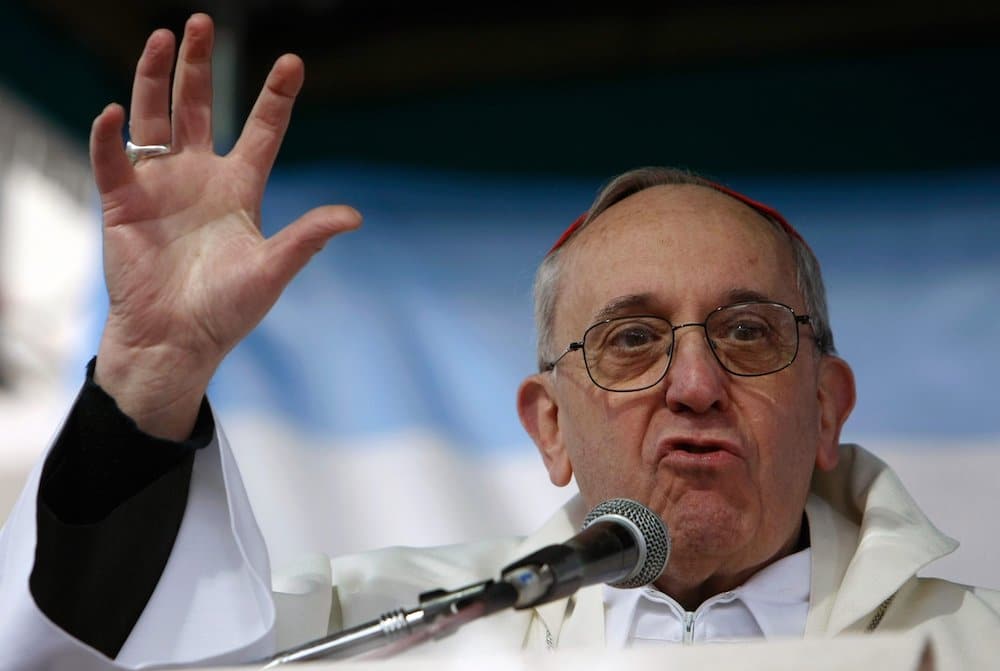
He continued: “Thinking of the next pope: he should be a man who, through the contemplation of Jesus Christ, from the adoration of Jesus Christ, helps the Church to go out from itself toward the existential peripheries, and helps her to be the fruitful mother who gains life from ‘the sweet and comforting joy of evangelizing.'”
To become such an evangelizing Church, Pope Francis wrote in his first apostolic exhortation, Evangelii Gaudium (“The Joy of the Gospel”), means recovering “a missionary impulse capable of transforming everything, so that the Church’s customs, ways of doing things, times and schedules, language and structures can be suitably channeled for the evangelization of today’s world rather than for her self-preservation” (emphasis added).
For Pope Francis, if the Church is to evangelize the world as it is with the Good News, it needs to take risks, to be transformed, to go out of its comfort zone. He captured the scale of the transformation in his famous quote: This is “not an era of change, but a change of era.”
Polls suggest that, a decade into his pontificate, the first Latin American and first Jesuit pope remains popular both among Catholics and non-Catholics. But his challenges to the status quo have also earned him criticism from some inside the Church who see his efforts at reform as more disruptive than transformative.
In the past 10 years, his scorecard of accomplishments has been impressive, however.
He has published three encyclicals and five apostolic exhortations.
He has made 40 foreign trips and counting. This year, the 86-year-old pontiff has already traveled to the Congo and South Sudan, and next plans to go to Portugal for World Youth Day.
He has appointed 60% of the world’s cardinal-electors, often placing them in unexpected dioceses or countries while ignoring traditional “cardinalate sees.”
He has launched a major reorganization of the Vatican Curia and finances and shaken up clerical expectations by appointing lay men and women to positions of responsibility.
He has held four synods and is about to hold another on the topic of synodality.
“Situations can change; people can change. Be the first to seek to bring good. Do not grow accustomed to evil, but defeat it with good.”
While at times confounded by the clergy sexual abuse crisis, he has attempted to hold bishops, as well as priests, accountable for their actions and their inactions.
And week in and week out he has been the Church’s pastor-in-chief with his pastoral talks, off-the-cuff comments and often headline-making interviews, exhibiting a 21st-century communicator’s knack for speaking directly both to Catholics and non-Catholics, disrupting traditional means of controlling papal messaging.
For Pope Francis, the ecclesial status quo he has fixated on includes the Vatican’s own bureaucracy, the challenge of clericalism, the Church’s synodal process, the Church’s openness to the Global South and the impact of climate change, and the ongoing efforts to address accountability and the clergy sexual abuse crisis.
To understand the pontificate of Pope Francis, one must understand what preceded him. The pontificates of Pope St. John Paul II and Benedict XVI lasted 35 years. Following in the wake of Vatican II and Pope St. Paul VI, these pontificates sought to calm the post-conciliar upheaval and affirm the Church’s doctrine, most evident in such efforts as the updating of canon law in 1983 and the creation of the Catechism of the Catholic Church in 1992. Evangelization was a priority, but understood in light of the struggles with communism and with Western-style consumerism, as well as with changing Western sexual mores and values. These dominated the Vatican’s concerns and influenced a generation of bishops and priests.
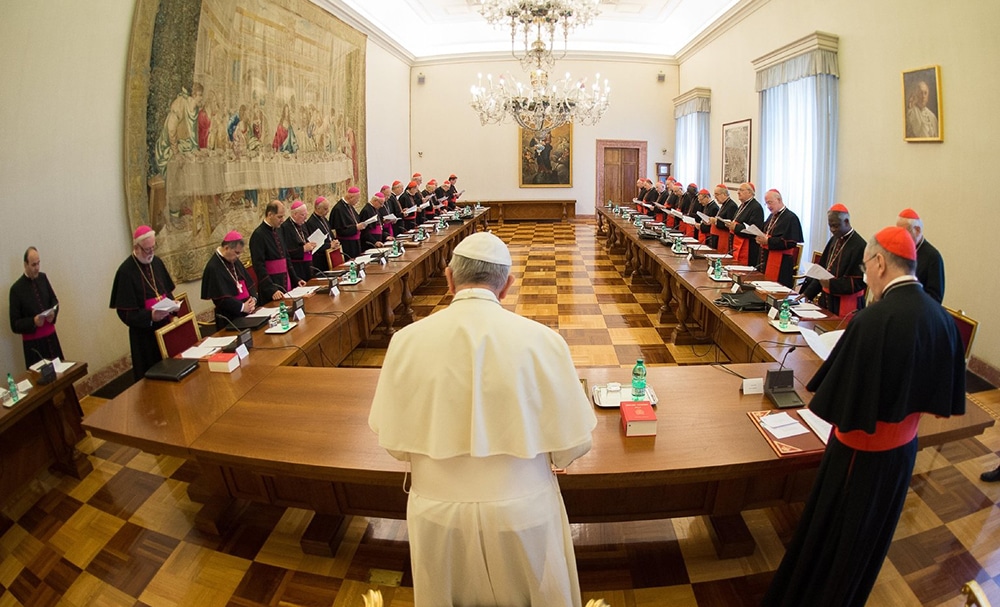
Reform of the curia
But even among many of these bishops, there were frustrations with how they were treated by the Roman curia. Francis alluded to this in his revealing 2013 interview with Jesuit Father Antonio Spadaro, saying that the curia could “run the risk of becoming institutions of censorship.” The curial offices “are mediators; they are not middlemen or managers,” he said.
In a 2022 interview with an Argentine news agency, he talked about the curial reform.
Francis said the reform grew out of what “we, the cardinals, had said at the pre-conclave meetings, the things we believed the new pope should do. Then, we spoke of the things that needed to be changed, the issues that needed to be tackled.”
“I carried out the things that were asked back then. I do not think there was anything original of mine. I set in motion what we all had requested,” he said.
His approach was quintessentially Francis. He brought together a council of cardinals early in his pontificate, and for more than eight years, they studied the reorganization finally proclaimed in Praedicate Evangelium (“Preach the Gospel”) in 2022. The sweeping changes combined some offices such as culture and education, and heightened the roles of others. The overall intent of this reorganization, the pope wrote, was “to better harmonize the present exercise of the curia’s service with the path of evangelization that the Church, especially in this season, is living.”
One of the most noticeable changes is the increasing role that lay men and women will play in these dicasteries, even assuming roles of leadership. As if to underscore the point, the pope appointed three women to the Dicastery for Bishops, a historic first.
He also appointed himself prefect of the Dicastery for Evangelization, emphasizing the overwhelming importance of evangelization in his vision for the Church.
Overall, the changes were intended to promote a “healthy decentralization” of the curia, giving more responsibility to bishops and bishop conferences, itself a significant change from the recent past. Critics warn that this decentralization is not without risks at times of disagreement and disunity.
Reform of the synodal process
Another example of frustration with the Vatican status quo concerned the synodal process. While over the past decades, synods of bishops have been held regularly, some complained privately about how controlled they were, with outcomes that seemed all but written in advance. In his revealing 2013 interview with Father Spadaro, Francis suggested, “Maybe it is time to change the methods of the Synod of Bishops, because it seems to me that the current method is not dynamic.”
The synod process has certainly become more “dynamic,” with broader consultations and an openness to a variety of controversial topics. Following synods on the family, youth and the Amazon, Francis now wants the entire Church to take on the task of synodality itself: How the Church is to understand this process, who is to participate and what is to be discussed.
“Synodality is the way of being the Church today according to the will of God, in a dynamic of discerning and listening together to the voice of the Holy Spirit,” Pope Francis has said.
“The Church does not exist to condemn people but to bring about an encounter with the visceral love of God’s mercy.”
This broad consultation for the forthcoming synod on synodality, including even people alienated from the Church or with strong criticisms of some of its teachings, has disconcerted many. Although the pope has repeatedly emphasized that the synod is not a legislature, critics have pointed to the synodal process taking place in Germany, which even Pope Francis has criticized as “elitist” and “ideological.”
“When ideology gets involved in Church processes, the Holy Spirit goes home,” he told the Associated Press recently.
What the fruits of the next synod will be are hard to predict, but it must be noted that while critics warned of radical changes afoot for both the synod on the family and the synod on the Amazon, the direst predictions did not come to pass.
A turn toward the peripheries
Pope Francis is Argentine, a man of the Southern Hemisphere keenly aware of the challenges of his country and continent. From his vantage point, he saw a Western-dominated Church that was losing its evangelizing fire. Its battles were remote from the daily concerns and challenges of the people with whom he rode the buses to work in Buenos Aires.
Latin America is the largest Catholic continent, yet had a relatively muted voice in the universal Church. In Africa and Asia, the Church is fast growing, young and dynamic. These global peripheries are where the damage from climate change, from wars, from poverty, from rapacious economies and rapacious governments are most evident. The migration crisis is a result of all these threats, and it was in the first months of his pontificate when Pope Francis flew to Lampedusa and drew the world’s attention to the cost in lives of migrants fleeing their homes for more hospitable environments.
“Jesus teaches us another way: Go out. Go out and share your testimony, go out and interact with your brothers, go out and share, go out and ask. Become the Word in body as well as spirit.”
In many speeches, and in his encyclical Laudato Si’, Pope Francis challenged this status quo, begging the world to look at environmental and migration issues from a global and holistic perspective. “Since God created the world for everyone,” he wrote, “every ecological approach needs to incorporate a social perspective which takes into account the fundamental rights of the poor and the underprivileged.”
Clergy sexual abuse crisis
Perhaps the most challenging crisis for Pope Francis, as it was for his immediate predecessors, has been the clergy sexual abuse crisis. It hit a low point in Chile when he defended a Chilean bishop accused of having knowledge of a priest’s abusive relationship with young men.
In the wake of the criticism he received, he ordered an investigation and ultimately reversed himself and apologized. Since then, he has taken numerous steps to increase accountability and transparency in sexual abuse cases. Like Pope Benedict, Francis has met with survivors numerous times.
When the scandal of then-Cardinal Theodore McCarrick broke in 2018, the pope committed to an unprecedented public report, which took two years to complete. He also held an extraordinary conference of the presidents of the world’s episcopal conferences to discuss the clergy sexual abuse crisis in a global context. In May 2019, Pope Francis issued Vos Estis Lux Mundi (“You are the light of the world”) for the universal Church revising and clarifying norms and procedures for holding bishops and religious superiors accountable. It also mandated a reporting system for dioceses and covered not only abusers but those who fail to take accusations seriously.
Vos Estis was followed by a 2021 revision of canon law, codifying laws and procedures for protecting children, promoting the investigation of allegations of clerical sexual abuse and punishing violators.
While Pope Francis has repeatedly committed himself to transparency, recent scandals involving retired Archbishop Michel Santier of France and the Jesuit artist Father Marko Rupnik have raised questions about what Vatican officials knew of the accusations and how effectively they responded.
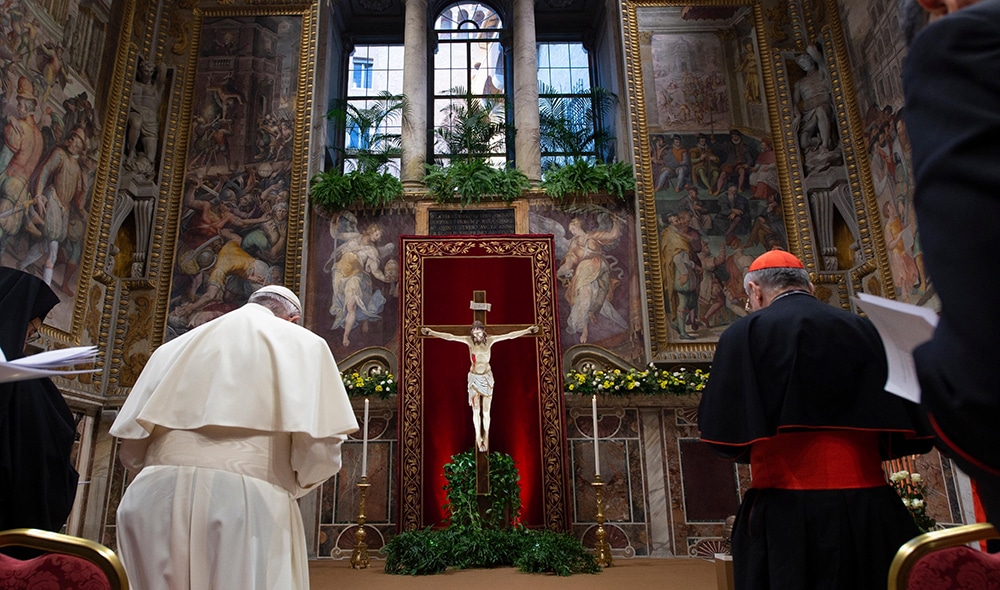
Understanding Pope Francis
Pope Francis has his share of critics, particularly in this country, who portray him as more disruptive and misguided than the reforming shepherd his defenders describe. The truth is that leaders in the Church, including most importantly the cardinal electors, knew all was not right either in Christendom as a whole or in the Vatican at the time of the 2013 conclave. Cardinal Bergoglio’s talk to the cardinals made clear his assessment of the status quo, and he was elected pope.
The problem, of course, with dramatic agents of change (who are usually prophets, not popes) is that such change can be confusing, even threatening. If for Pope Francis, the Faith is not meant to be a security blanket, for many Catholics — particularly in the West — the Faith is a rare point of stability in a world of cultural earthquakes and upheaval.
Cardinal George Pell, the recently deceased collaborator and critic of Pope Francis, said of conservative distrust of the pope, “I think a lot of conservative Catholics feel a little bit confused, a little bit uncertain, they wonder just what is being taught.”
This is the same Cardinal Pell who also wrote that “this pontificate is a disaster in many or most respects; a catastrophe,” and called the current synodal process “a toxic nightmare.”
To which Pope Francis responded that although he wished he wasn’t criticized “for the sake of tranquility … I prefer that they do it because that means there’s freedom to speak.”
The papacy is not a dictatorship, he said. “Criticism helps you to grow and improve things.” He called Pell “a great guy” and said he did much to speed the Vatican’s needed financial reform.
“I see clearly that the thing the Church needs most today is the ability to heal wounds and to warm the hearts of the faithful; it needs nearness, proximity.”
Pope Francis’s response, in addition to its humility, suggests a man comfortable in the gray areas, not a characteristic one might normally expect to find in a pope. This ability to reside within the contrasts and paradoxes is what can frustrate both friends and critics.
Papal biographer Austen Ivereigh wrote that Francis believes “that in the Church contrasting points of view are fruitful and creative, but can become contradictions when they fall out of the unity of the whole and develop in opposition to the body.”
Many of the pope’s critics distrust what they see as a less-than-transparent liberal agenda. Some take issue with the many public statements, and statements attributed to him. At the same time, those liberals hoping for some German-style revamping of the Church to better suit modern prejudices and inclinations are frustrated as well by his criticism of elitist ideologies.
Given the assorted controversies that can follow the pope’s public statements, one might conclude that the pope should cut back on interviews. In fact, in his interview with Father Spadaro at the beginning of his pontificate, Pope Francis said he “prefers to think carefully rather than give quick responses to on-the-spot interviews. He feels that the right answers come to him after having already given his initial response.”
But that the pope is willing to accept the occasional controversies recalls something he said a year before he became pope: “If I had to choose between a wounded Church that goes out onto the streets and a sick, withdrawn Church, I would definitely choose the first one.”
And his ability to speak off the cuff, often with folksy expressions or pithy observations, is what has made him popular even as its pastoral language frustrates some theologians and bishops. He has found a way to connect with people, to be a Church of Yes, to open the doors of the Church to the outside world and to be heard out there.
It also seems true, in light of all the tumult surrounding his synods, including the forthcoming one, that Francis does not feel he has to know the outcome of the actions he sets in motion. As one expert in Ignatian spirituality told me, “He’s a son of Ignatius. He consults widely, points in a general direction, doesn’t claim to know how exactly to get there, pays careful attention to the process of decisions. He’s an optimist.”
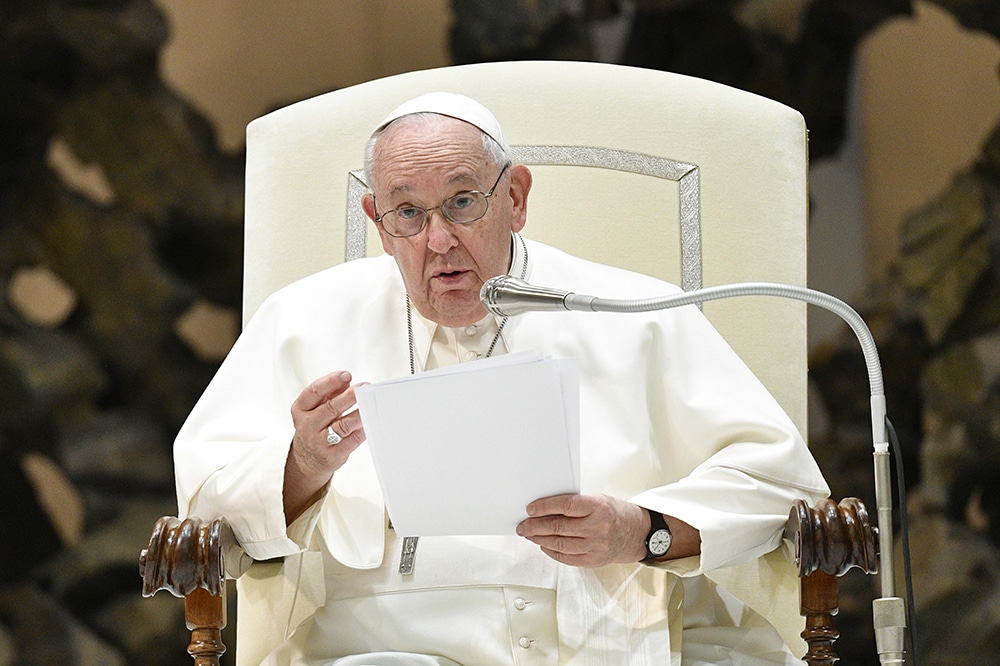
Following the Holy Spirit
For those used to the rigor of the Wojtyla pontificate or the precision of the Ratzinger one, this all seems unbearably sloppy. But it also is the mark of a man who wrote, “There is no greater freedom than that of allowing oneself to be guided by the Holy Spirit.”
Yet, he has also been decisive, unafraid to slay some sacred cows, to prosecute bishops, to appoint lay women and men to important positions of authority, to rein in the cavalier, if not corrupt, curial finances. He has been an outsider pope not trapped by the Vatican’s status quo.
At the same time, his eloquent sensitivity to the concerns of the global south may in turn be construed as insensitive to the concerns of the rich but struggling Western churches. The cultural and economic globalism that he chides for what it is doing to third world countries has, in fact, created havoc in the first and second worlds.
The desire for radical change or a desire for a return to the certainties of tradition are both reactions to this havoc. They are not only a pharisaical craving for legalisms or an elitist reaction. As one bishop put it, in his Western European country, it is believers themselves who are the periphery.
All of this has been made worse in the United States by its devastating political polarization that, in turn, has infected how Catholics view the pope and his message. For Francis, the advice he might give us may be the same he offered concerning the ecumenical possibilities for the Eastern and Western Churches.
“We must walk united with our differences: there is no other way to become one,” he told Father Spadaro. “This is the way of Jesus.”
On the eve of perhaps the most important synod of his pontificate, what is unshakable is the pope’s remarkable faith in the Holy Spirit, and this faith transcends agendas and ideologies.
In what is a cri de coeur that may sum up his pontificate, he ends “Joy of the Gospel” with this impassioned plea:
“How I long to find the right words to stir up enthusiasm for a new chapter of evangelization full of fervor, joy, generosity, courage, boundless love and attraction! Yet I realize that no words of encouragement will be enough unless the fire of the Holy Spirit burns in our hearts. … I implore him to come and renew the Church, to stir and impel her to go forth boldly to evangelize all peoples.”
Greg Erlandson, the ninth director of Catholic News Service, previously served as president and publisher of Our Sunday Visitor.

